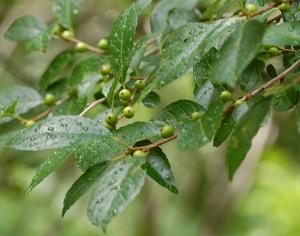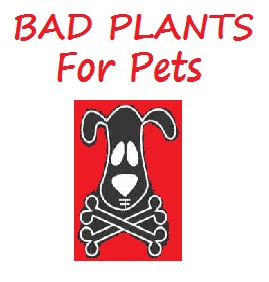Winterberry

A member of the Aquifoliaceae, more commonly known as the Holly family, this plant is but a single member of the more than 400 species that comprise the genus Ilex. Widespread throughout the temperate and subtropical regions of the world, the genus Ilex includes numerous species of trees, shrubs, and climbers, with evergreen or deciduous foliage and inconspicuous flowers. Holly is a versatile, hardy plant common throughout North America that can be found in both temperate and tropical regions from sea level to more than 6,600 ft in the case of high mountain species. In North America there are 39 native and introduced species of holly.
There is no documentation in the medical record confirming pet related deaths from the ingestion of Holly. In fact, when researching the toxins and/or toxicity of holly it became apparent that the poisonous properties of holly plants are frequently overstated and that holly has a long history of use in holistic medicine. Yaupon holly, Ilex vomitoria (Cassena), was used during the American Civil War to create a mild caffeine containing tea for use as a coffee and tea substitute by southerners. Yerba Mate or Paraguay Tea is a caffeinated drink made from the holly Ilex paraguariensis var. paraguariensis and is still widely used as a stimulating tea. The bark, leaves and fruit of Ilex cornuta (Chinese Holly) are still used in herbal medicine for their general tonic value as well as for diseases of the kidney. Thus it would appear that although most species of Holly are listed as toxic or deadly, they are in fact mildly toxic at best. This is further evidenced by the fact the foliage and fruit (drupes) are eaten by a variety of wildlife species. Humans likewise have also used the genus for food in certain situations without serious consequence.
Most sources agree symptoms of ingestion by a pet will be limited to gastrointestinal upset (vomiting, diarrhea), abdominal pain, and possible drooling, lethargy and other symptoms commonly associated with a non seriously ill, but sick animal. Toxic Plants of North America by George E. Burrows, states:
Rarely, digestive tract problems are reported for horses or other animal species (Finance 1987). Effects in pets are usually limited to apparent irritation of the gastrointestinal tract with salivation, vomiting, and perhaps diarrhea in some cases (Volmer 2002). Feeding trials in young calves fed frozen I. myrtifolia (myrtle holly) every third day over 16 days or daily for 35 days produced no adverse clinical or pathologic effects (Pence et al. 2001).
Avoid further ingestion of the plant and consult a veterinarian. Life threatening intoxication in animals is exceedingly rare. In regards to a specific treatment regimen, common sense symptomatic care will probably be all that is required. If the ingestion was recent remove any existing plant matter from the mouth and if vomiting does not occur it may be induced by giving a teaspoon or less (size dependent) of 3% hydrogen peroxide orally. The pet will more than likely start vomiting on their own without the help, as their body tries to expel this non digestible material. In cases of human ingestion activated medical charcoal has been successfully used to help rid the body of the primary toxins and return the victim to health. Ensure the pet gets plenty of fluids to avoid possible dehydration caused by diarrhea. To alleviate the gastrointestinal upset and diarrhea; Kapectolin may be given at a dose rate of 1 to 2 ml/kg four times a day. Kapectolin provides a coating action that protects the stomach lining. Sucralfate may also be used as for gastrointestinal irritation as it reacts with the acids in the stomach to form a paste-like material capable of acting as a barrier between the stomach and its contents. Sucralfate is typically given to dogs weighing more the 60lbs: 1g every 6 to 8 hours; for dogs under 60 lbs: 0.5g every 6 to 8 hours; Cats: 0.25g every 8 to 12 hours to reduce irritation of the stomach and intestines. The prognosis will depend on the severity of the intoxication, however serious intoxications of animals are exceptionally rare and in most cases symptoms will be limited to gastrointestinal upset (vomiting and diarrhea).




